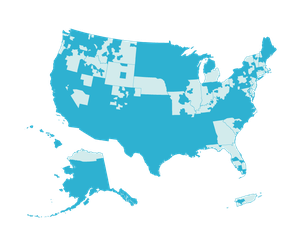At a summit gathering more than 300 community leaders and partners from around the country in Bozeman, MT, Rural LISC leads strategic conversations about crucial issues ranging from economic and workforce development to broadband access to the devastating scourge of the opioid epidemic.
Rural LISC to host economic and workforce development experts to share successful strategies at a summit for rural leaders
300+ community leaders from around the country are coming together August 28-30 to share strategies that revitalize rural America
BOZEMAN, Mont. (Aug. 28, 2017)—Rural communities face many challenges that stunt economic growth and hinder job creation. This week, Rural LISC will host a national conversation on creative approaches to attract employers, stimulate business, create jobs and improve life in rural America.
“What we’re really talking about is the quality of life in rural America,” said Suzanne Anarde, vice president at the Local Initiatives Support Corporation (LISC) and director of Rural LISC. “That means taking on the various challenges that grip so many communities as part of comprehensive efforts to drive economic opportunity into struggling rural areas. This includes: lack of broadband access; comprehensive approaches to building savings, credit and assets of potential employees; rural housing; and the opioid crisis.”
Rural LISC, a national nonprofit program focused on the needs of rural America, provides funding and expertise to rural redevelopment efforts, working with 81 community-focused nonprofits in 44 states and reaching more than 2,000 rural counties. At its annual Rural Seminar in Bozeman this week, more than 300 community leaders across the country are coming together to consider critical economic and social threats that damage the quality of life for rural residents.
One such topic is Rural LISC’s new national initiative that tackles the rural opioid epidemic by channeling capital to hard hit communities to build treatment facilities, strengthen rural health programs and disseminate successful community-based treatment models that can be replicated across the country.
Led by Rural LISC and unveiled this week during a landmark gathering of rural leaders here, the plan is part of a broad strategy to address the economic, housing, health and education needs of small towns and farming communities, especially those that have lost businesses and jobs to a changing economy.
In addition to the new opioid initiative, the conference will feature the U.S. Department of Agriculture’s Anne Hazlett, who was recently named assistant to the Secretary for Rural Development. She will share USDA’s vision and offer insight on emerging federal efforts to build rural prosperity. Maurice Jones, LISC’s president and CEO, who was raised in rural Virginia and is deeply connected to these issues, will also address the gathering. He will offer details of LISC’s ongoing commitment to rural progress and its support for rural partners.
Other highlights of the three-day event include:
Native American Initiative: Rural LISC has been working with partners to study new ways to collaborate with Native American communities to find meaningful ways to invest capital, build the capacity of local nonprofits and tailor proven programs focused on financial opportunity, safety and health in Indian Country.
Economic solutions: The event will feature scalable strategies that rural communities can adopt to address concerns around housing and infrastructure, economic and workforce development, and health and safety. It will also hone in on the WealthWorks toolkit, which offers a blueprint for designing economic and community development programs in rural areas.
Progress in action: Rural leaders will get a firsthand look at successful community development efforts in Montana with a tour led by Human Resource Development Council of District IX and featuring work to expand affordable housing and businesses in ways that expand the economic power of rural communities.
“The Seminar is Rural LISC’s signature event,” said Anarde. “This year’s gathering of more than 300 of the country’s most innovative rural advocates is a record for us. It speaks to the tremendous energy around this work, and the need for new strategies to drive growth in communities often overlooked as too small, too sparsely populated or too poor to respond to robust investment efforts. We’re working to change that.”
The Seminar will be held August 28-30 at Big Sky Resort, 50 Big Sky Resort Road, Big Sky, Mont. It is not open to the public, but media is invited to attend.
ABOUT LISC
With residents and partners, LISC forges resilient and inclusive communities of opportunity across America – great places to live, work, visit, do business and raise families. Since 1980, LISC has invested $17.3 billion to build or rehab 366,000 affordable homes and apartments and develop 61 million square feet of retail, community and educational space across the country.
ABOUT RURAL LISC
Launched in 1995, Rural LISC is the rural component of the largest community development support organization in the country, called LISC (Local Initiatives Support Corporation). For 22 years, Rural LISC has partnered with rural communities, helping to forge innovative solutions that lead to prosperity and opportunity. Rural LISC’s investments in rural America have totaled $1.14 billion in grants and low-cost loan funds. Rural LISC has leveraged this investment resulting in $2.8 billion from public and private sources, to produce 31,500 affordable homes and apartments, create 3.8 million square feet of commercial and community space, assist 600 businesses, create 6,800 jobs and support 20 early childhood centers. By generating resources and investing in the grassroots efforts of its 81 partner community-based organizations, Rural LISC is committed to making rural communities good places to live, work, do business and raise children. Learn more at www.lisc.org/rural
For Immediate Release:
August 28, 2017
Contact:
Nadia Villagrán, Rural LISC
760.641.3307
nvillagran@lisc.org
